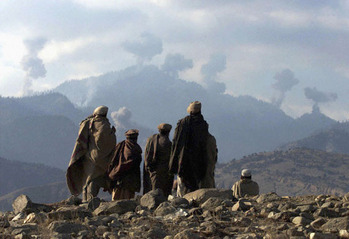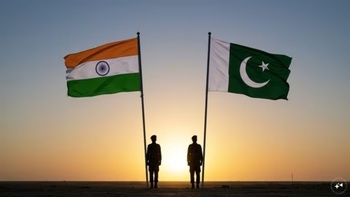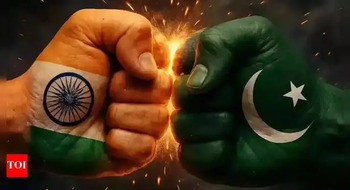Osman Softić ||12 May 2025
The Pashtun and Balochistan separatist movements
 Tilak Devasher, a former India’s high-level mandarin in the realm of security and regional affairs with vast experience in regional relations, and one of India’s most respected experts on Pakistan (as acknowledged by Pakistani press), particularly when it comes to the Pashtun question and Balochistan separatist movements, has produced serious academic studies explaining the historical background of these movements, their political aspirations, and their methods of operation.
Tilak Devasher, a former India’s high-level mandarin in the realm of security and regional affairs with vast experience in regional relations, and one of India’s most respected experts on Pakistan (as acknowledged by Pakistani press), particularly when it comes to the Pashtun question and Balochistan separatist movements, has produced serious academic studies explaining the historical background of these movements, their political aspirations, and their methods of operation.
This indicates the existence of serious research and interest, as well as detailed and accumulated knowledge about Pakistan in India, which is available to Indian state institutions. This knowledge, of course, can be useful for India in its confrontation with Pakistan. Although India supported anti-Taliban forces in Kabul for two decades, it has managed to build relations with the new Taliban authorities in Kabul much better than Pakistan has. Devasher believes that one reason for the military effectiveness of separatist movements against the Pakistani army in recent times ought to be attributed to their access to effective and devastating modern weapons, which these groups previously lacked.
However, after the withdrawal of the U.S. troops from Afghanistan, the Americans left behind vast quantities of modern weaponry, which likely found its way into the hands of separatist movements, including the Pakistani Taliban (TTP), Balochistan militants (BLA), and other groups. This possibility leads to the conclusion that the former U.S. Biden administration deliberately left a large quantity of weapons to the Taliban in Afghanistan with the intent that they will eventually reach these separatists. The reason for this could be the effectiveness and dedication of these movements in fighting not only the Pakistani army but also Chinese interests in Pakistan. This ultimately means slowing down, if not entirely derailing, the China-Pakistan Economic Corridor (CPEC) project in Pakistan, which is the backbone of China’s global Belt and Road Initiative (BRI). The interests of Washington and New Delhi vis-à-vis China in this case are convergent, if not entirely identical.
The U.S. connections
The frustrations of the Pakistan Shehbaz Sharif government over possible U.S. support for Pakistani separatists were likely one of the motives behind the Pakistani defence minister’s recent statement in an interview with Sky News’ Yalda Hakim, in which he said that “for over 30 years, Pakistani authorities have used various terrorist movements at the behest of their masters in Washington to achieve their strategic interests”.
India has capitalized on this clumsy statement by Minister Khawaja Asif, using it as anecdotal evidence that Pakistan’s deep state is responsible for the terrorist attack in Pahalgam on April 22. These statements, particularly General Munir’s speech, were interpreted in India as proof of providing ideological justification, encouragement, and even a trigger for the recent terrorist attack on tourists in Kashmir.
Indian authorities believe that Pakistan seeks to incite interfaith hostility to the level of civil war in India to destabilize the country and hinder its economic and strategic development, encouraging Muslims in India to emigrate or rebel. Serious-minded people in India are aware that social harmony and stability are vital for India’s progress and the entire South Asian region. From the perspective of Indian strategy, any attempt by Pakistan to disrupt them could have negative consequences for the entire region.
General Munir’s speech, however misinterpreted or unnecessary at the time, was skillfully used by Indian state strategists and intelligence services to manipulate and shift responsibility onto Pakistan for the recent tragedy in Pahalgam.
The two-nation theory
 In recent times, there has been increasingly open discussion in India about the mistaken decision by Indian authorities in 1947 to agree to the partition of the country, which resulted in the creation of Pakistan under the patronage of British colonial masters. The “two-nation theory”, with all its connotations of alleged irreconcilable coexistence between Hindus and Muslims, is the foundational principle of Pakistan.
In recent times, there has been increasingly open discussion in India about the mistaken decision by Indian authorities in 1947 to agree to the partition of the country, which resulted in the creation of Pakistan under the patronage of British colonial masters. The “two-nation theory”, with all its connotations of alleged irreconcilable coexistence between Hindus and Muslims, is the foundational principle of Pakistan.
The Pakistani army, as the guardian of the Pakistani state, has always maintained that its prerogative is not only to protect Pakistani territory but also to guarantee its ideology. However, until now, no Pakistani army chief or political leader has, at least publicly, resorted to the rhetoric of Muhammad Ali Jinnah from the 1940s about irreconcilable Hindu-Muslim differences, as General Asim Munir recently did.
Jinnah, once regarded as an “ambassador of Hindu-Muslim unity,” ultimately evolved into the father of the Pakistani state based on the two-nation theory, which triggered the largest interfaith and interethnic “peacetime conflict” in modern human history. To rally Muslims to his cause, Jinnah sought to prove that Hindus and Muslims constitute two separate and irreconcilable nations, justifying the partition of India into two states.
The presence of significant minorities in both states, Jinnah believed, would ensure that both would treat their minority populations humanely. However, the partition led to an exodus of Hindus and Sikhs from West Pakistan and the persecution of Muslims from what was then East Punjab. Many Muslims from other parts of northern India, and some from the south, chose to migrate to West Pakistan.
The situation in the east was different. A significant number of Muslims remained in India in West Bengal and Assam, while a large Hindu population stayed in East Pakistan (Bangladesh). Muslims who remained in India rejected the two-nation theory. Their descendants today seek to resolve their status within the framework of India’s secular constitution, which is increasingly under attack from extremist Hindus.
The Jammu Kashmir resolution
The resolution adopted by the Jammu and Kashmir assembly immediately after the terrorist attack in Pahalgam is based precisely on the claim of India’s secular (though only in theory, not in practice) values enshrined in its constitution. For this reason, in India, Munir’s evocation of the two-nation theory is seen as nothing short of provocation.
In his speech, General Asim Munir stated that Pakistan’s forefathers believed that: “we are not the same as Hindus in every possible aspect of life. Our religions are different, our cultures are different, our traditions are different, our thoughts are different, our ambitions are different. That was the basis of the two-nation theory that was laid there, that we are two nations, not one. That is why our forefathers fought, waged that relentless struggle to create this country. Our forefathers persevered in it, and we have sacrificed a lot to create this country and know how to defend it,” said the chief of staff of the Pakistani army, General Asim Munir.
His speech is particularly indicative at a time when Pakistan is facing a severe financial and economic crisis, serious separatist armed challenges on two fronts, international pressures, and political instability due to the fact that Pakistani democracy is under threat, and Imran Khan, the former prime minister and leader of Pakistan’s most popular political force, Pakistan Tehreek-e-Insaf (Pakistan Movement for Justice), is in prison.
The current Pakistani government is considered weak and unstable, lacking genuine democratic legitimacy among the people, and its survival is guaranteed only by the support of Pakistan’s armed forces, which hold real power. In this sense, Asim Munir is perceived in India as Pakistan’s de facto leader, which is why his statements have been met with some nervousness and interpreted as a signal to Indian Muslim citizens that they can never be fully part of India’s political and constitutional order, effectively a call to rebellion.
The nuclear war?
 India’s threats of military retaliation against Pakistan for the crime in Kashmir, along with military mobilization and preparations that will likely lead to some form of military operation against Pakistan in the near future and an inevitable kinetic conflict between the two states—though it is difficult to predict when, in what form, and with what intensity—have been taken seriously in Pakistan. In times of heightened tensions with India, Pakistan inevitably experiences a homogenization of its population, regardless of deep internal political divisions.
India’s threats of military retaliation against Pakistan for the crime in Kashmir, along with military mobilization and preparations that will likely lead to some form of military operation against Pakistan in the near future and an inevitable kinetic conflict between the two states—though it is difficult to predict when, in what form, and with what intensity—have been taken seriously in Pakistan. In times of heightened tensions with India, Pakistan inevitably experiences a homogenization of its population, regardless of deep internal political divisions.
This was recently confirmed by Dr. Moeed Yusuf, former national security advisor to the previous Imran Khan government, fully supports any decision by the Pakistani army and government to respond in the event of Indian aggression. Yusuf confirmed that Pakistan reserves the right to use tactical nuclear weapons against India in the event of a threat to its survival. Pakistan has never signed an agreement committing to a “no first nuclear strike” policy. India has signed such an agreement and pledged never to launch a nuclear attack first unless attacked.
Pakistan is one of the few countries possessing tactical nuclear weapons, which India does not have, (both countries do have vast strategic nuclear arsenal sufficient to vaporize each other many times over), that can be used on the battlefield. This means Pakistan retains the right to use tactical nuclear weapons in specific cases, such as if the Indian army occupies part of Pakistan’s sovereign territory, blocks the flow of water from India into Pakistan, or imposes a blockade on Pakistan’s port of Karachi. These are just a few examples that could provoke a Pakistani tactical nuclear response against India.
This was recently explained by Najam Aziz Sethi, an experienced Pakistani political analyst from Lahore, the founder and editor-in-chief of the Pakistani newspaper The Friday Times, and a former acting chief minister of Punjab province, and confirmed by former national security official Moeed Yusuf. Sethi proposed the formation of a neutral international commission to investigate the background and causes of the attack and identify the perpetrators of the terrorist crime in Kashmir, which would prove that Pakistan was not involved in any way, if the government in New Delhi agrees.
Moreover, in Pakistan, as emphasized by Sethi, there is a prevailing belief that the recent terrorist attack in Pahalgam may have been the work of India’s deep state, to create a pretext for a potential confrontation with Pakistan, provoke the anger of the U.S. and its allies against Pakistan, at a time when India has strategically aligned itself with the policies of Washington and Israel, while Pakistan has distanced itself from the US, though not entirely fallen out of favor with Washington, particularly due to its close alliance with Beijing.
Some analysts even speculate that the terrorist crime in Kashmir could even be the work of third parties outside Pakistan and India, whose interest lies in sparking a conflict between the two countries and potentially eliminating Pakistan’s nuclear arsenal and Pakistan as the only nuclear-armed Muslim state.
 Osman Softić is a Research Fellow at the Islamic Renaissance Front. He holds a BA degree in Islamic Studies from the Faculty of Islamic Studies of the University of Sarajevo and has a Master degree in International Relations from the University of New South Wales (UNSW). He contributed commentaries on Middle Eastern and Islamic Affairs for the web portal Al Jazeera Balkans, Online Opinion, Engage and Open Democracy. Osman holds dual Bosnian and Australian citizenship.
Osman Softić is a Research Fellow at the Islamic Renaissance Front. He holds a BA degree in Islamic Studies from the Faculty of Islamic Studies of the University of Sarajevo and has a Master degree in International Relations from the University of New South Wales (UNSW). He contributed commentaries on Middle Eastern and Islamic Affairs for the web portal Al Jazeera Balkans, Online Opinion, Engage and Open Democracy. Osman holds dual Bosnian and Australian citizenship.

